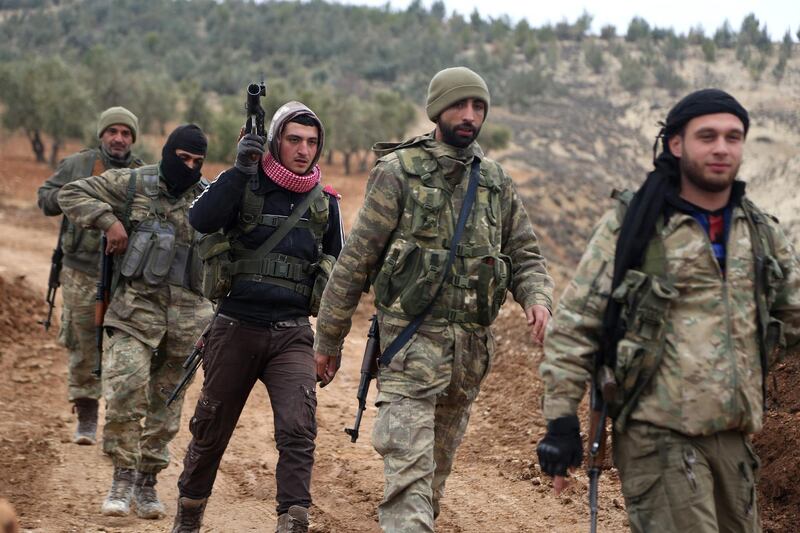Hundreds of thousands of civilians were reported to be at risk on Wednesday as the Turkish president vowed to widen Ankara's incursion into northern Syria beyond the Kurdish-held enclave of Afrin.
The United Nations' refugee agency (UNHCR) said as many as 322,000 people in and around Afrin were at risk of being killed or displaced, and that 5,000 had already fled their homes.
The UN said it was receiving reports that both Syrian government forces and fighters from the People's Protection Units (YPG), the Kurdish militia that is the target of Turkey’s offensive, were preventing civilians from escaping.
Some citizens were sheltering in caves while others moved toward Afrin from the city's outskirts under what was described as the worst shelling by the Turkish military since the fighting began.
Turkish president Recep Tayyip Erdogan said the five-day-old offensive in Afrin was "continuing successfully" and that Turkey would extend its military operations in Syria to the town of Manbij, located further east in a larger contiguous territory held by Kurdish-dominated forces.
Such a move by Ankara could potentially bring Turkish forces into confrontation US troops, who are stationed in that area.
But Turkey's deputy prime minister, Bekir Bozdag, said separately that he did not think Turkish troops would come face-to-face with American forces.
He added that Turkey was ready for all kinds of co-operation with the United States and Russia if that would bring peace to the region.
US president Donald Trump was expected to raise concerns about the Afrin campaign in a phone call with Mr Erdogan on Wednesday.
______________
Read more:
[ Syria refugee killed by rocket fire in Turkey was a devoted grandfather ]
Analysis: Turkey offensive in Syria is a barometer for the unfolding conflict
______________
The Turkish campaign "detracts from efforts to fight the Islamic State group", said a senior US administration official.
In recent days, Russian, French and US officials have all called on Turkey to show restraint in its assault against the YPG. Ankara considers the YPG a terrorist group because of its links to the Kurdistan Workers' Party (PKK), which has waged an insurgency against the Turkish government since the 1980s.
But the YPG is also Washington's closest ally on the ground in Syria and played a significant part in the victory against ISIL, which has been driven from most of the territory it previously held in the country. The group dominates the Syrian Democratic Forces, a militia the US continues to support with weapons and training.
The enclave the YPG controls around Afrin is cut off from the larger contiguous territory held by the YPG and SDF further east and already surrounded by Turkey's Syrian Arab militia allies. Nonetheless, Ankara appears in for a tough fight against an estimated 8,000 YPG fighters who are also rallying local civilians to pick up arms.
Mr Erdogan has said ISIL fighters around Afrin are also the target of Turkey’s operation, though there have been no credible reports of such a presence.
The Turkish military claimed on Tuesday to have killed at least 260 YPG and ISIL fighters since the operation began.
Muataz Raslan, an officer in Jaish Al Nukhba, a rebel group that is part of the Euphrates Shield, an alliance of Turkish-supported Free Syrian Army (FSA) factions, said the offensive had slowed somewhat on Wednesday due to inclement weather.
Mr Raslan said Turkish forces fighting with Jaish Al Nukhba had warned of an ISIL presence, but that he had seen no evidence to support that claim.
SDF and YPG officials have also denied there is any ISIL presence near Afrin. They also say Turkey is exaggerating the number of YPG fighters it has killed but have not offered their own figures.
As of Wednesday, the Syrian Observatory for Human Rights said Turkish shelling and airstrikes in Afrin had killed 28 civilians, while two civilians had been killed near the Syrian opposition-held town of Azaz as a result of shelling by the YPG. A further two civilians died of wounds sustained in YPG rocket attacks on the Turkish border town of Kilis on Wednesday, Turkish officials said.
The Observatory, a Britain-based monitoring group, said 48 FSA fighters had been killed and that the death toll among the YPG was so far at 42.
Turkey says that two of its soldiers have been killed.
Merve Tahiroglu, a Turkish analyst with the Foundation for Defence of Democracies told Agence France-Presse that he believed Turkey’s offensive was launched after striking some kind of deal with Russia, which has entered the Syrian war on behalf of president Bashar Al Assad's government and has also supported Kurdish factions.
Mr Tahiroglu said it was likely Russia gave its approval for Turkey’s attack on the YPG in exchange for Turkish agreements for a de-escalation process in Syria’s Idlib province, to the west of Afrin. Turkey backs rebels in Idlib who continue to battle the Syrian government.
Damascus and its allies continued to press an offensive against rebels in Idlib on Wednesday, with the UN reporting that a quarter million people had been displaced in Idlib since that operation began in mid-December.
*Additional reporting by Reuters and Agence France-Presse





